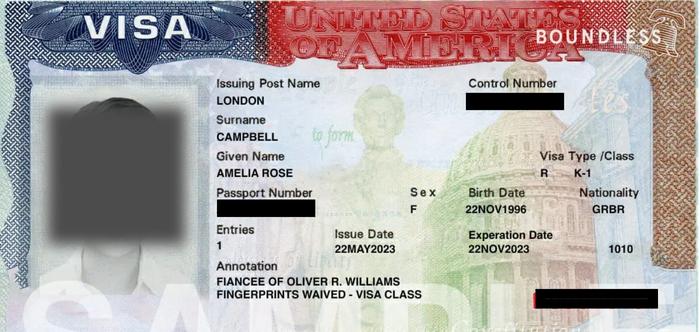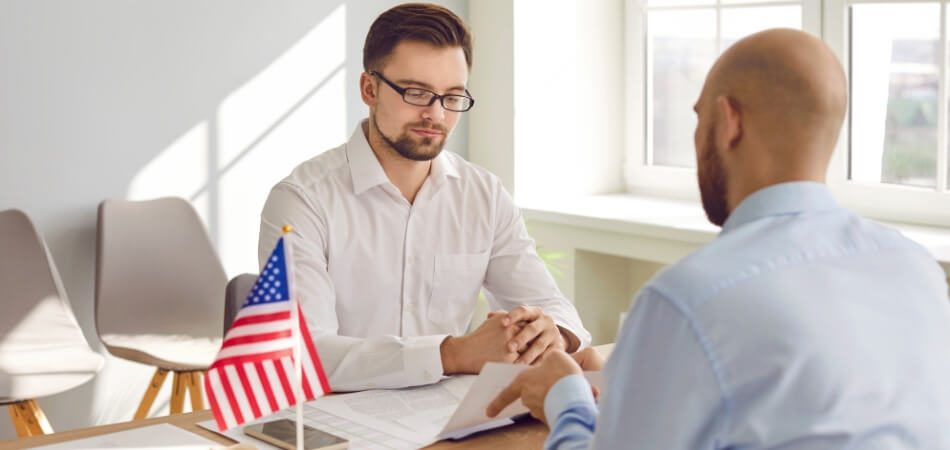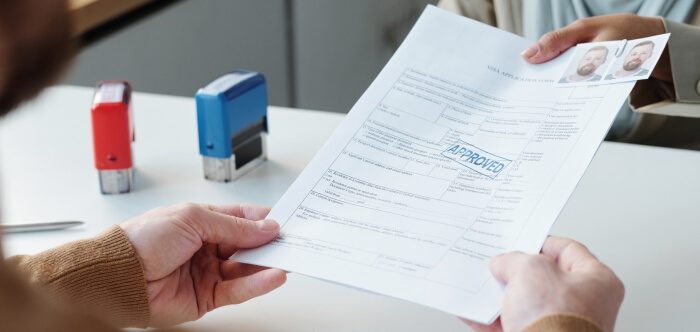A USA Conference Visa, commonly known as a B-1 visa, allows individuals to attend professional or academic events in the United States. It is essential for non-immigrants looking to participate in business-related activities. But, how long does it take to get a conference visa for USA?
The process generally takes between 6 to 8 months, depending on the applicant’s country and the specific U.S. embassy or consulate handling the application. Since processing times may vary, it’s highly recommended to apply early.
Follow the rest of this article to explore more details, tips, and important steps to ensure your U.S. conference visa application goes smoothly.
What is a Conference Visa?
A conference visa, specifically the B-1 visa, allows foreign visitors to enter the U.S. for business-related activities. It is designed for individuals attending meetings, conferences, or professional events. This visa does not permit employment or study, focusing only on temporary business purposes. Applicants must provide proof of their event participation to qualify for this visa.
Obtaining a conference visa involves several steps, including filling out forms and attending an interview at a U.S. embassy. Each applicant must demonstrate the intent to return home after the event. Your local embassy or consulate and your country determine how long it takes to process your application. Applicants are encouraged to apply early to avoid any delays.
For those planning to attend International Conferences in USA 2024 With Invitation Letter, a B-1 visa is necessary. This ensures smooth entry for participation in business events, seminars, or academic conferences. Make sure to gather all the necessary documents, including an official invitation. When you prepare early, you increase your chances of getting an approval before the deadline.
Who Needs a Conference Visa to Attend a USA Conference?
A visa is often required for attending a conference in the USA, depending on your nationality. To avoid delays when traveling, you must know if you need one. Here’s an overview of who needs a visa and the specific requirements:
Non-U.S. Citizens
Anyone who is not a U.S. citizen will likely need a visa to attend conferences. The visa type typically required is the B-1 visa. It allows visitors to participate in business events, such as conferences. Check if your country has specific agreements with the U.S. for visa exemptions.
Visa Waiver Program (VWP) Countries
Citizens from Visa Waiver Program countries do not need a visa to attend short conferences. They can stay in the U.S. for up to 90 days without a visa. However, they must apply for an Electronic System for Travel Authorization (ESTA). Always check if your country is part of the VWP before planning your trip.
Business Professionals
If you’re attending a conference as part of your professional duties, you will need a B-1 visa. This visa is specifically for business-related events, including meetings and conferences. Make sure to bring an invitation letter from the event organizers. Proper documentation ensures a smooth visa application process.
Students and Academics
Students and academics attending educational conferences may need a B-1 visa. It is important to provide documents showing your academic purpose. These could include letters from your institution or conference organizers. Always apply early to avoid processing delays.
Canadian Citizens
Canadian citizens do not usually require a visa to attend U.S. conferences. However, it’s essential to know the visa requirements for Canadians to attend USA conference, even if a formal visa isn’t needed. They must carry proof of their conference invitation or professional purpose. This helps streamline entry at the U.S. border and ensures smooth travel experiences. Always check for any recent changes in immigration rules.
Event Organizers and Speakers
Conference organizers or invited speakers will need a B-1 visa for entry. They should provide details of their role in the conference. Proof of invitation and purpose is essential for the visa application. Early preparation ensures no complications during travel.
The USA Visa Application Process
Acquiring a visa for the USA might initially seem overwhelming, given the myriad of requirements and steps involved. However, breaking it down simplifies the journey and makes it less intimidating. To assist potential candidates, the following detailed, step-by-step breakdown is provided:
Determine the Correct Visa Type
Before diving in, it’s essential to identify the visa type best suited for your travel purpose. Whether you’re a student, tourist, or a business professional, there’s a specific category tailored to your needs. Making the right choice simplifies the subsequent steps.
Complete the DS-160 Form
The DS-160, or the Online Nonimmigrant Visa Application, is a pivotal step. Ensure all information provided aligns with your documents. After submission, you’ll receive a confirmation number. protect it as it’s indispensable for future procedures.
Pay the Visa Fee
The next step involves covering the application fee. It’s imperative to note that fees can differ based on the visa type. Once you’ve made the payment, retain the receipt. This document becomes crucial when you’re about to schedule your interview.
Schedule Your Interview
Almost all visa categories require an in-person interview. There are certain age exemptions, but most applicants must go through this process. Book your slot at the U.S. Embassy or Consulate closest to you. Keep in mind that the wait times can fluctuate based on various factors.
Attend Your Visa Interview
On the day of your interview, punctuality and preparation are paramount. A consular officer will evaluate your application through a series of questions. Their role is to ascertain whether you meet the criteria for the visa category applied. Honesty and clarity in your responses can significantly influence the outcome.
Await the Decision
Once the interview concludes, your application enters the decision phase. Some applicants might receive an immediate verdict, while others could be subject to additional checks. Always monitor your application status via official channels or the embassy’s website.
Equipped with this detailed guide, hopeful travelers can confidently navigate the intricacies of the USA visa application process, ensuring a smoother experience.
How Long Does it Take to Get a Conference Visa for USA?
Obtaining a conference visa for the United States is a process that involves several factors impacting the time it takes to receive your visa approval. Here’s an in-depth look at the various elements that influence the processing duration:
Visa Category and Complexity
The specific conference visa category you apply for, such as B-1 (business visitor) or F-1 (student), and the complexity of your case can significantly impact the processing time. Some visas, like J-1 exchange visitor visas for academic and cultural exchange programs, may involve additional administrative steps, potentially extending the processing period.
Consulate or Embassy Workload
The workload at the U.S. Consulate or Embassy where you submit your application plays a pivotal role. Busier locations may experience longer processing times due to the higher volume of applications they handle. Smaller consulates might process applications more swiftly.
Seasonal Variations
Timing matters when applying for a U.S. conference visa. Peak travel seasons, such as summer and holidays, often see a surge in visa applications. As a result, processing times may be longer during these periods.
Administrative Processing
In certain cases, such as when additional security clearances are required, applications may undergo administrative processing. This can significantly extend the time it takes to receive your visa, sometimes by several weeks or even months.
Application Completeness
Ensuring your application package is complete and accurate is essential to avoid processing delays. Any missing documents or errors can result in requests for additional information, causing further delays.
Individual Circumstances
Your individual circumstances, including your travel history and any unique aspects of your case, can influence the processing time. Applicants with a straightforward history may experience quicker processing.
To ensure a smooth process, apply well in advance of your intended travel dates and use the tracking system provided by the embassy or consulate to monitor your visa application’s status. By considering these factors and planning ahead, you can navigate the conference visa application process effectively.
USA Conference Visa- How long does it last?
A USA conference visa, also known as the B-1 visa, is typically issued for business events. It allows visitors to stay temporarily in the country for specific purposes. The length of the stay is determined by the immigration officer upon entry. However, the visa usually permits a stay of up to six months.
While the visa might allow for multiple entries, each visit has a limited duration. The actual time allowed depends on your individual travel plans and conference dates. It’s essential to confirm the specific details before you travel. Always check the duration US conference visa before booking your return trip.
Extensions may be requested if you need to stay longer for additional events. The application for an extension must be filed before your visa expires. Approval for an extended stay depends on various factors, including your reason for the request. Early planning ensures you remain in compliance with U.S. visa regulations.
Common Reasons for Visa Delays and Rejections
When applying for a visa, individuals may encounter delays or even rejections, leading to disappointment and frustration. Understanding the common factors behind such issues is essential:
- Incomplete Documentation: Failing to submit all required documents, such as bank statements, invitation letters, or travel itineraries, can cause delays or rejections.
- Inaccurate Information: Providing inconsistent or false information on your application forms can raise suspicions, leading to visa denials.
- Insufficient Financial Support: Demonstrating an inability to cover travel expenses or sustain oneself abroad can result in concerns about financial stability.
- Criminal Record: A history of criminal offenses, especially those involving moral turpitude, can lead to visa denials.
- Overstaying Previous Visits: Previous violations of visa terms, such as overstaying, may negatively impact future visa applications.
- Weak Ties to Home Country: Insufficient evidence of ties to one’s home country, such as family, employment, or property, can raise doubts about your intention to return.
- Dubious Intentions: Misrepresentation of intentions, such as seeking employment on a tourist visa, can result in visa rejections.
- Health Issues: Serious health conditions without proper medical insurance or evidence of ongoing treatment can lead to visa denials.
- Prior Visa Denials: Past visa denials can cast a shadow on subsequent visa applications, making approval more challenging.
- Limited Travel History: A lack of prior international travel experience may be viewed as a risk factor, especially for long-term visa applications.
visa delays and rejections often happen due to problems with documents, accuracy, money, legal history, connections to your home country, and your reasons for travel. To boost your chances, prepare well, follow instructions carefully, and handle potential issues promptly.
Tips for Faster Conference Visa Processing
Getting a conference visa can be time-sensitive, especially when you have an upcoming event in the United States or another country. Here are essential tips to expedite the conference visa application process:
Apply Early and Plan Ahead
Start your visa application process well in advance of your conference date, considering factors like peak application periods, to ensure sufficient time for document collection and potential processing delays.
Choose the Correct Visa Category
Carefully select the most appropriate visa category, such as a B-1 business visa for conferences, a B-2 visitor visa for event participation, or other relevant options, ensuring a precise alignment with the purpose of your trip.
Complete the DS-160 Form Accurately
Fill out the DS-160 form meticulously, with extra attention to accuracy and consistency. Even minor errors or discrepancies in personal information can lead to processing delays or visa denials.
Pay Fees Immediately
After submitting your DS-160 form, promptly pay the visa application fee through the specified payment channels. Retain the payment receipt as essential documentation to track your payment and for future reference.
Schedule the Visa Interview Early
Once you’ve paid the fee, schedule your visa interview at the nearest U.S. Embassy or Consulate as soon as possible. Appointment slots can fill up rapidly, especially during peak travel seasons, so early scheduling is essential for timely processing.
Prepare Thorough Documentation
Gather and meticulously organize all necessary documents, including your valid passport with a minimum of six months validity, DS-160 confirmation page, visa fee receipt, and a recent passport-sized photo that adheres to specific guidelines. Ensure that your documentation is comprehensive, accurate, and well-organized to prevent any processing delays.
By diligently following these comprehensive guidelines, you can facilitate the conference visa application process, minimize delays, and significantly enhance your prospects of securing a visa in time for your important event.
FAQs About How Long Does it Take to Get a Conference Visa for USA?
When planning to attend a conference in the USA, understanding the visa process is essential. The time it takes to secure a conference visa can vary, and there are many factors involved. Below are frequently asked questions about the timeline for obtaining a U.S. conference visa.
How Does the Embassy’s Workload Affect Visa Processing Time?
The workload at the U.S. Embassy or Consulate can impact how long your visa application takes. Busier embassies, especially during peak travel seasons, may experience delays. It is wise to apply early to avoid any processing issues caused by high demand.
Can My Application Be Expedited for Urgent Conferences?
Yes, in certain cases, the U.S. Embassy may offer expedited processing for urgent conferences. However, you must provide a legitimate reason, such as an invitation to speak at the event. Contact your local embassy for specific details on expedited services.
How Can Seasonal Variations Affect My Visa Application?
Seasonal variations, such as peak travel times during summer or holiday periods, can extend visa processing times. Embassies receive higher volumes of applications during these times. To avoid delays, apply well in advance of any major travel seasons.
Can I Track My Visa Application Status?
Yes, you can track your visa application status online through the U.S. Department of State’s official website. After your interview, you will receive a tracking number to monitor the status. Checking your application regularly helps you stay updated on its progress.
What Happens If My Visa Application Is Denied?
If your visa application is denied, you will receive an explanation for the denial. Common reasons include incomplete documentation or concerns about your return to your home country. You can reapply after addressing the reasons for the denial, but it’s crucial to correct any issues.
Bottom Line
Attending international conferences can be a game-changer for many professionals and scholars. It opens doors to global networks, novel ideas, and broadened horizons. But before setting foot in such enriching environments, particularly in the United States, it’s essential to tackle the logistics. How long does it take to get a conference visa for USA? is a common query, and understanding the process is the first step towards a hassle-free journey.
The visa application process can be complicated, with various elements dictating its duration. From choosing the right visa type to preparing for the interview, every step matters. A blend of preparation, accurate documentation, and timely actions can pave the way for a smoother experience.
In summary, while the path to securing a conference visa for the USA might seem daunting initially, it’s entirely navigable with the right guidance. Stay informed, start early, and let the anticipation of the conference fuel your motivation to navigate the visa process efficiently.








